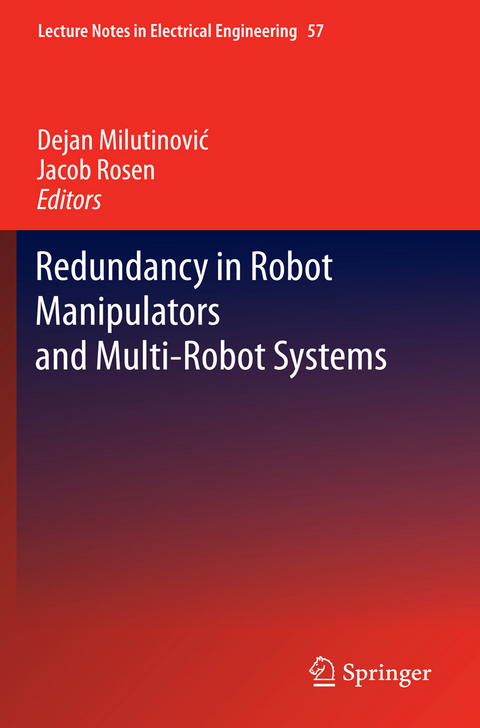
Redundancy in Robot Manipulators and Multi-Robot Systems
Springer Berlin (Verlag)
978-3-642-44139-4 (ISBN)
The trend in the evolution of robotic systems is that the number of degrees of freedom increases. This is visible both in robot manipulator design and in the shift of focus from single to multi-robot systems. Following the principles of evolution in nature, one may infer that adding degrees of freedom to robot systems design is beneficial. However, since nature did not select snake-like bodies for all creatures, it is reasonable to expect the presence of a certain selection pressure on the number of degrees of freedom. Thus, understanding costs and benefits of multiple degrees of freedom, especially those that create redundancy, is a fundamental problem in the field of robotics.
This volume is mostly based on the works presented at the workshop on Redundancy in Robot Manipulators and Multi-Robot Systems at the IEEE/RSJ International Conference on Intelligent Robots and Systems - IROS 2011. The workshop was envisioned as a dialog between researchers from two separate, but obviously related fields of robotics: one that deals with systems having multiple degrees of freedom, including redundant robot manipulators, and the other that deals with multirobot systems. The volume consists of twelve chapters, each representing one of the two fields.
Performance of Serial Underactuated Mechanisms: Number of Degrees of Freedom and Actuators.- Low-Cost Multi-Robot Localization.- Using torque redundancy to optimize contact forces in legged robots.- Exploiting Heterogeneity in Robotic Networks.- Variational Analysis of Snakelike Robots.- Robustness in the Presence of Task Differentiation in Robot Ensembles.- Cooperating Mobile Cable Robots:.- Deployment algorithms for dynamically constrained mobile robots.- Kalman Smoothing for Distributed Optimal Feedback Control of Unicycle Formations.- M*: A Complete Multirobot Path Planning Algorithm with Optimality Bounds.- Individual Control of Redundant Skeletal Muscles using an Exoskeleton Robot.- Synthesizing Redundancy Resolution Criteria of the Human Arm Posture in Reaching Movements.
From the reviews:
"A topic of great interest to the robotics community--multi-robot systems, or redundant robotic systems--is addressed in this book. ... The audience for this book is mostly those involved in cutting-edge research. I also recommend it to students who are thinking about a possible topic for their master's or PhD thesis." (Ramon Gonzalez Sanchez, ACM Computing Reviews, January, 2013)
| Erscheint lt. Verlag | 9.11.2014 |
|---|---|
| Reihe/Serie | Lecture Notes in Electrical Engineering |
| Zusatzinfo | VIII, 244 p. |
| Verlagsort | Berlin |
| Sprache | englisch |
| Maße | 155 x 235 mm |
| Gewicht | 391 g |
| Themenwelt | Informatik ► Theorie / Studium ► Künstliche Intelligenz / Robotik |
| Technik ► Elektrotechnik / Energietechnik | |
| Technik ► Maschinenbau | |
| Schlagworte | Distributed Systems • Medical Robotics • Mobile Robots • multi-robot systems • Redundancy • redundant manipulators • Robotics • swarm robotics • wearable robotics |
| ISBN-10 | 3-642-44139-4 / 3642441394 |
| ISBN-13 | 978-3-642-44139-4 / 9783642441394 |
| Zustand | Neuware |
| Haben Sie eine Frage zum Produkt? |
aus dem Bereich


